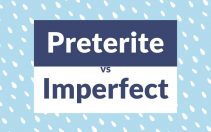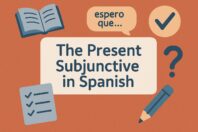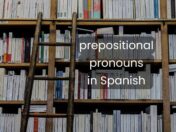Present Perfect Subjunctive Spanish: Explained in 5 Minutes

Get our free email course, Shortcut to Conversational.
Have conversations faster, understand people when they speak fast, and other tested tips to learn faster.
More infoAlthough the Spanish subjunctive is generally considered the most confusing concept of Spanish grammar, in the post, you’ll learn how you can start easily using Present Perfect Subjunctive Spanish right away.
As you probably know by now, the subjunctive is a mood, not a tense.
What does this mean?
The subjunctive is one of three moods that we use in Spanish – the others being the indicative and imperative moods.
In general, the subjunctive is used to frame statements that include some degree of uncertainty.
More specifically, the present perfect subjunctive mood is used to speak about past actions that are connected to the present, as well as future actions that may or may not be completed.
The reason this subjunctive form causes some confusion, is mostly due to the fact that it doesn’t have an English equivalent, which means some sentences sound a bit strange when we try to translate them directly.
For example:
- I’m glad that we have talked before you leave – Me alegra que hayamos hablado antes de que te vayas
- Go out and play once you have finished your homework – Sal y juega una vez que hayas terminado tu tarea
Don’t worry – we’ll go into more detail on this later on.
For now, let’s review how to conjugate verbs in this mood.
First, a super useful tip.
Any Spanish grammar structure that includes the word “perfect”, will use the auxiliary verb “haber”
For example, if you already studied the present perfect Spanish, then you’ll remember that its conjugation requires a simple formula:
- Auxiliary verb “haber” (present tense) + past participle of the action verb.
The present perfect subjunctive requires a similar formula:
- Auxiliary verb “haber” (present subjunctive) + past participle of the action verb.
As you can see, the only difference is that the auxiliary verb “haber” is conjugated in its present subjunctive, rather than in the present tense.
| Personal pronoun | Verb Haber (Present Subjunctive) |
| Yo | Haya |
| Tú | Hayas |
| Él / Ella | Haya |
| Usted | Haya |
| Nosotros | Hayamos |
| Ustedes | Hayan |
| Ellos / Ellas | Hayan |
Once you know that “haber” is conjugated differently, all you need to do is add the past participle of the action verb.
Let’s review how to find the past participle.
For all regular -AR verbs, we use the ending -ado as follows:
| English Infinitive | Spanish Infinitive | English Past Participle | Spanish Past Participle |
| To buy | Comprar | Bought | Comprado |
| To close | Cerrar | Closed | Cerrado |
| To cut | Cortar | Cut | Cortado |
As for all regular verbs that end in -ER and -IR, we use then ending -ido at the end of the conjugation:
| English Infinitive | Spanish Infinitive | English Past Participle | Spanish Past Participle |
| To Eat | Comer | Eaten | Comido |
| To know | Conocer | Known | Conocido |
| To sleep | Dormir | Slept | Dormido |
| To hear | Oír | Heard | Oído |
(as always, there some irregular verbs that need to be conjugated differently – you can read about those verbs here)
When To Use Present Perfect Subjunctive Spanish
We already mentioned that the subjunctive is used when a speaker wants to convey uncertainty in a statement.
In this section, we are going to provide more specific examples of this.
The present perfect subjunctive has many uses and can be used to convey emotions, possibility, feelings, doubts, uncertainty, opinions, desires, and expectations.
As we mentioned before, this form is typically used to speak about past actions that are connected to the present, or future actions that may or may not be completed.
Here are some common examples:
Opinions (ie. something isn’t a fact)
- I don’t think it has been true – No creo que haya sido verdad
- I doubt that he has traveled that much – Dudo que haya viajado tanto
Things that are likely to happen
- It is possible that they’ve arrived late today – Es posible que hayan llegado tarde hoy
- It is possible that those tourists have been on the beach this morning because they are really tanned – Es posible que esos turistas hayan estado en la playa esta mañana porque están muy bronceados
Wishes and expectations (feelings)
- I hope you’ve had a good day – Espero que hayas tenido un buen día
- I hope you liked the gift – Espero que te haya gustado el regalo
Past Actions related to the present
Present perfect subjunctive is used whenever we want to speak about an action that was supposed to happen in the past, but we don’t know whether it happened or not, or how it went.
For example:
- It’s possible that I’ve lost all my money – Es posible que haya perdido todo mi dinero
Above, we are talking about a possibility. The action happened in the past, but right now, in the present, we don’t know if I’ve lost the money or not – we just guess that it could have happened.
- It is possible that they’ve found a good restaurant – Es posible que hayan encontrado un buen restaurante
- I hope that the soccer team had won the match – Espero que el equipo de fútbol haya ganado el partido
Future actions that may or may not be completed
It can also be used to describe actions that we expect to be finished in the future.
These actions also indicate a feeling of uncertainty as we described before. We don’t know if an action is going to take place in the future or not, but we guess and expect that it could.
Take a look at these examples:
- I wish that we’ve already sold the house by next year – Deseo que para el próximo año ya hayamos vendido la casa
- Call your mother when you’ve finished the homework – Llama a tu madre cuando hayas terminado la tarea
(sidenote: We wrote an overview of all six Spanish subjunctive forms here)
Practice: Present Perfect Subjunctive Spanish
Conjugate the relative verbs in the persent perfect subjuntive.
(scroll to the bottom for the answers)
1.Haber / Terminar
Dime cuando _____ _____ de cocinar (Tell me when you have finished cooking)
2.Haber / Limpiar
Podremos salir, cuando _____ _____ nuestra habitación (We can go out when we have cleaned our room)
3.Haber / Salir
Ojalá todo _____ _____ bien en su cita a ciegas (I hope everything went well in his blind date)
4.Haber / Comprar
No creo que ella _____ _____ un carro nuevo (I don’t think she bought a new car)
5.Haber / Tener
Espero que _____ _____ una hermosa luna de miel (I hope you had a beautiful honeymoon)
6.Haber / Salir
Podrán ver al paciente cuando el _____ _____ de quirófano (You will be able to see the patient when he has left the operating room)
7.Haber / Poner
Es bueno que te _____ _____ una chaqueta porque hace frío (It’s good that you put on a jacket because it’s cold)
8.Haber / Ver
Dudo que _____ _____ un unicornio (I doubt you’ve seen a unicorn)
9.Haber / Terminar
Cuando _____ _____ de leer este libro, voy a comprar otro (When I have finished reading this book, I will buy another one)
10.Haber / Oír
Tal vez ella _____ _____ lo que dijiste (Maybe she heard what you said)
Answers
1.Dime cuando hayas terminado de cocinar
2.Podremos salir, cuando hayamos limpiado nuestra habitación
3.Ojalá todo haya salido bien en su cita
4.No creo que haya comprado un carro nuevo
5.Espero que hayan tenido una hermosa luna de miel
6.Podrán ver al paciente cuando haya salido de quirófano
7.Es bueno que te hayas puesto una chaqueta porque hace frío
8.Dudo que hayas visto un unicornio
9.Cuando haya terminado de leer este libro, voy a comprar otro
10.Tal vez ella haya oído lo que dijiste



